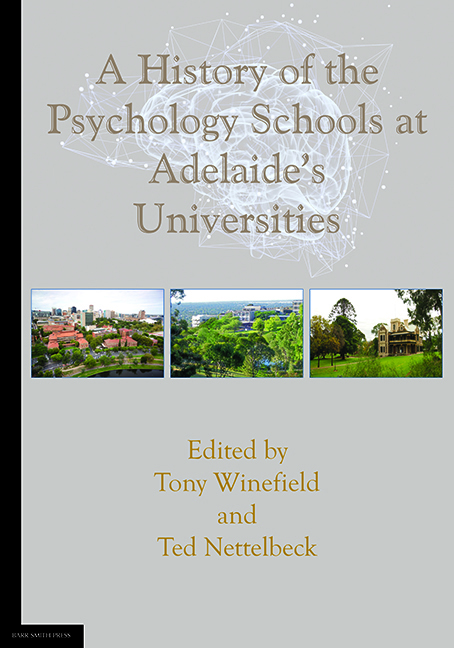Book contents
- Frontmatter
- Contents
- List of contributors
- Preface
- 1 Introduction
- 2 The origins and early history of the University of Adelaide's School of Psychology
- 3 The later years
- 4 Teaching applied psychology at the University of Adelaide: A personal view
- 5 Flinders University: Psychology in the twentieth century
- 6 Recent history of Flinders School of Psychology
- 7 The history of Psychology at the University of South Australia: From little things big things grow
- 8 The history of Psychology at the University of South Australia: Recent history
5 - Flinders University: Psychology in the twentieth century
Published online by Cambridge University Press: 25 July 2017
- Frontmatter
- Contents
- List of contributors
- Preface
- 1 Introduction
- 2 The origins and early history of the University of Adelaide's School of Psychology
- 3 The later years
- 4 Teaching applied psychology at the University of Adelaide: A personal view
- 5 Flinders University: Psychology in the twentieth century
- 6 Recent history of Flinders School of Psychology
- 7 The history of Psychology at the University of South Australia: From little things big things grow
- 8 The history of Psychology at the University of South Australia: Recent history
Summary
Note
This chapter was compiled and edited by Leon Lack, but contains contributions (as listed in the relevant sections below) from Norman Feather, Paul Douglas, Nigel Bond and Peter Wilson.
Introduction
Leon Lack
Given my longevity in the Discipline/Department/School of Psychology from 1971 through to the present, and given that I have viewed its operation at all academic levels from senior tutor on up, it was perhaps appropriate that I was asked to be responsible for getting together observations of the history of this period. It was also fitting that we hear from the perspective of the heads of the unit across this period of time — particularly Professor Norm Feather, the founding professor and head for perhaps the longest period, who is still present most days of the week as emeritus professor, sixteen years after retirement and into his eighties. Included also is a contribution from Professor Nigel Bond, head from 1992-96, and Professor Peter Wilson, head from 1997-2001.
These contributions are woven together with snippets of other aspects of psychology at Flinders — aspects that are less a part of the formal history, but may give a more visceral feel of the place and people across the twentieth century.
We start appropriately with a piece from Professor Norman (Norm) Feather, which draws on an article that he published in the Bulletin of the Australian Psychological Society (1995). He revised the material for this volume to bring it up to date and it is presented here as a personal record.
The early years
Norman Feather
The establishment of psychology as an academic discipline at Flinders University occurred in the context of the discussion about what kind of academic structure the new university should adopt and where psychology would fit within that structure. Eventually, in an attempt to facilitate links between disciplines and to break away from old structures, it was decided to establish a number of schools rather than faculties. Psychology was located in the School of Social Sciences, along with other disciplines that included history, politics, social administration, geography, and economics.
- Type
- Chapter
- Information
- A History of the Psychology Schools at Adelaide's Universities , pp. 125 - 154Publisher: The University of Adelaide PressPrint publication year: 2016



